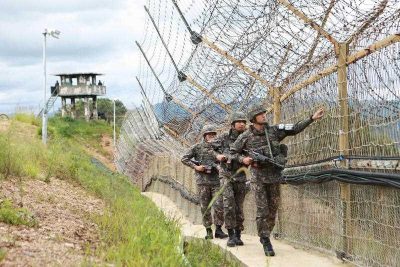
On the brink of a crisis that threatened to escalate into conflict, North and South Korea recently reached an agreement on 25 August to prevent further confrontation, resume official talks, hold reunions of separated families and promote civilian exchanges.
This was a remarkable reversal in tensions. But the thaw is only the beginning of a precarious and long journey toward peace and stability on the Korean peninsula. As long as Pyongyang keeps its nuclear weapons program, it is virtually inconceivable that confidence-building and peaceful co-existence between the two Koreas can be achieved.
Since March 2009, the North Korean nuclear issue has been stalled and the Six-Party Talks suspended. While North Korea has declared ‘no more talks with the US’, Washington is equally reluctant to engage with Pyongyang unless the hermit regime takes some concrete steps toward denuclearisation. Stuck between the two, China, South Korea and other the other Six-Party Talks members have become lethargic. Are there any ways out?
The recent Iranian nuclear deal could serve as a useful benchmark. As President Barack Obama claims, it was a victory of diplomacy over war. Several factors account for its success. Setting realistic goals was one of those factors. Against the conservative’s all-or-nothing approach of insisting on ‘no deal without a complete removal of nuclear programs’, the US admitted Iran’s right to the peaceful use of nuclear energy, while banning its enrichment programs under a tight inspection regime.
Equally crucial was setting the right priorities. Iran has been notorious for its sponsorship of terrorist groups such as Hezbollah, interference in the domestic politics of neighbouring countries, undermining regional stability and human rights violations. But the nuclear issue was prioritised, with the anticipation that other issues would become easier to solve once the nuclear one was settled.
The US also aptly limited sanctions, which was useful in bringing Iran to the negotiation table and making the current deal. Additional sanctions would have created a serious political backlash, which could have penalised moderates such as Iranian President Hassan Rouhani while empowering such hardliners as radical Islamic forces and the military.
Iran and North Korea are, of course, very different. Iran does not have nuclear weapons, while North Korea does. The permanent members of UN Security Council have all reached a consensus on the Iranian deal, but members of the Six-Party Talks have been divided over how to deal with the DPRK.
Iran has taken a practical path to denuclearisation for economic gains, whereas North Korea is seeking the perilous nuclear path despite enormous economic costs incurred by sanctions. No matter how limited it may be, Iran has a pluralistic political system with regular competitive elections. North Korea, on the other hand, is an extremely monolithic political system without any free elections.
For all the differences, the Iranian model can still be applied to North Korea. Sanctions, pressure and military action are not viable alternatives. The US should forsake its ‘strategic patience’ policy and engage. Demonising North Korea will lead the US nowhere. As with Iran, the US should set more practical goals. Complete, verifiable and irreversible dismantling of its nuclear weapons will take a long time.
As Siegfried Hecker — a renowned US nuclear expert — has suggested, it would be wiser to seek a ‘halt and roll back’ option. Freezing current nuclear programs and rolling back to the level specified by the agreement reached on 13 February 2007 — whereby North Korea agreed to shut down and seal its major nuclear research facility, Yongbyon, and invite international monitoring — might be the most practical solution.
No matter how powerful the US is, it cannot achieve complete denuclearisation, opening and reform, human rights improvements and cyber security in North Korea simultaneously. There must be a reordering of priorities where utmost attention is given to the nuclear issue.
The Iranian nuclear deal would have never materialised without personal commitments by top US Department of State officials like John Kerry, William Burns, Wendy Sherman and President Obama himself. In a similar vein, high powered figures need to be appointed solely to deal with Pyongyang.
It is not easy for Obama to change his position on North Korea, particularly given his political schedule. Outside pressure seems necessary. Such pressure can come from South Korean President Park Geun-hye, who will be visiting Washington in October 2015. Using recent improved inter-Korean relations as leverage, Park can persuade Obama to engage with the North and to resume the Six-Party Talks. Such an approach is the only realistic one that can bring North Korea back to the negotiating table and foster the process of its denuclearisation.
It is ironic to note that learning from its failures in dealing with North Korea was vital to the United States’ success in dealing with Iran. Now it is time for the Obama administration to apply what it has learned from Iran to North Korea.
This article has been republished from eastasiaforum.org.